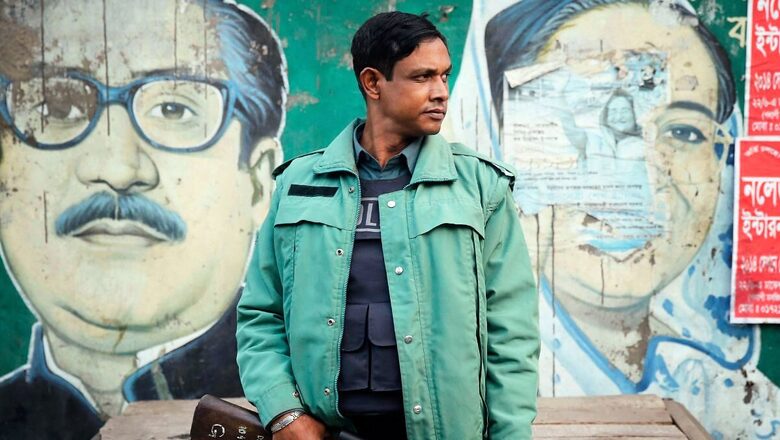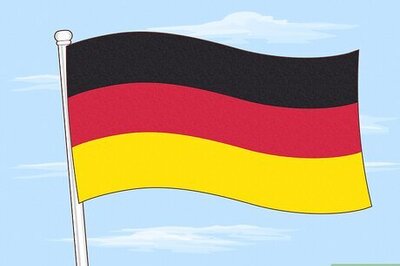
views
Bangladesh, a country born out of a war in 1971, was marred by protests over the past few days, which culminated in the resignation of Prime Minister Sheikh Hasina on Monday.
As she left the country, Army Chief General Waqar-uz-Zaman announced on Monday, “I’m taking all responsibility (of the country). Please cooperate.”
Hasina, the 76-year-old daughter of Bangladesh founder Sheikh Mujibur Rahman, had been ruling the strategically located South Asian nation since 2009. She was elected for a record fourth consecutive term and fifth overall term in the 12th general election held in January, amid a boycott by the main opposition party Bangladesh Nationalist Party (BNP) of former premier Khaleda Zia and its allies.
More than 100 people have been killed in the protests against the Hasina government over the past two days. The country has been witnessing fierce demonstrations over the controversial quota system that reserves 30 per cent of jobs for the families of veterans who fought the 1971 liberation war.
HASINA’S EXIT: JULY 1-AUGUST 5
- July 1, 2024: Students initiated blockades, disrupted roads and railway lines against the quota, which they said favoured Hasina’s ruling Awami League.
- July 16: Violence escalated with the deaths of six people in the clash between protesters and government supporters in Dhaka. Hasina’s government closed schools and universities nationwide.
- July 18: Protesters set on fire the headquarters of Bangladesh Television along with other government buildings. The government imposed an internet blackout, even as 32 died and hundreds were injured.
- July 21: Bangladesh’s Supreme Court ruled against reintroducing job quotas, a decision critics said aligned with the government.
- August 4, 2024: The clash led to 68 deaths, including of 14 police officers. Former Army chief General Ikbal Karim Bhuiyan urged the government to withdraw troops. Current Army chief Waker-uz-Zaman stated the armed forces “always stood by the people”.
- August 5, 2024: Leaders of the civil disobedience campaign called on supporters to march on Dhaka for a “final protest”, which ended in Hasina’s resignation and exit from the country.
#BreakingNews | Sheikh Hasina to go to London via IndiaExclusive input : @manojkumargupta@siddhantvm shares detailsAvantika Singh | #Bangladesh #BangladeshViolence pic.twitter.com/o34DaoJgZu
— News18 (@CNNnews18) August 5, 2024
BORN OUT OF PAKISTAN
Earlier a part of East Pakistan after the Partition post India’s independence, the Bangladesh Liberation War led to the formation of the nation. The war began when the Pakistani military junta based in West Pakistan—under the orders of Yahya Khan—launched Operation Searchlight against the people of East Pakistan on March 25, 1971, initiating the Bangladesh genocide. Pakistan was defeated, and Bangladesh was born as an independent, secular democracy in 1972 with Sheikh Mujibur Rahman as its leader.
THE KEY COUPS AND ASSASSINATIONS IN BANGLADESH
Rahman followed the Pakistan’s style for army, which served as militia for the ruling government and got unbridled powers. A state of emergency was imposed in 1974. Bangladesh has seen 29 coups so far. A look at the major ones:
- August 15, 1975: A military coup was launched by mid-ranking army officers in Bangladesh to replace the secular Rahman government with an Islamic government led by Khandaker Mushtaque Ahmed. Sheikh Mujib and most of his family members were killed in the coup.
- November 3, 1975: Ahmed was removed from power in a coup organized by Brigadier Khaled Mosharraf, Bir Uttom, a decorated veteran of the Bangladesh war of Independence in 1971. He put Major General Ziaur Rahman, the Chief of Army Staff and fellow independence War leader, who was not believed to have supported the August coup, under house arrest, but did not execute him.
- November 7, 1975: It was launched by left-wing army personnel in collaboration with left-wing politicians from Jatiya Samajtantrik Dal. The coup killed Mosharraf and freed Ziaur Rahman from house arrest and allowed him to eventually seize power and become president.
- 1977-1982: Ziaur Rahman survived 21 assassination attempts since the war of Independence in 1971. While Ziaur continued to enjoy popularity, supporters of the Awami League were not happy. He went on tour to Chittagong on May 29, 1981, to help resolve an intra-party political dispute in the regional Bangladesh National Party (BNP). He was assassinated by a group of army officers, who also killed six of his bodyguards and two aides. It was part of a large conspiracy masterminded by Lt.General Hussain Muhammad Ershad.
- In a coup on March 24, 1982, Ershad stormed into Bangabhaban and at gunpoint removed President Abdus Sattar from office and proclaimed himself Chief Martial Law Administrator (CMLA), and suspended the constitution. He took over as president on December 11, 1983, replacing A. F. M. Ahsanuddin Chowdhury.
- 1996: On May 19, 1996, Abdur Rahman Biswas, the President of Bangladesh caretaker government, ordered Lieutenant General Abu Saleh Mohammad Nasim to force the retirement of two senior army officers. Nasim’s coup ended unsuccessful as he was arrested.
- 2007: Army Chief Lt. Gen Moeen U. Ahmed staged a military coup on January 11, 2007. Fakhruddin Ahmed was made head of government. President Iajuddin Ahmed had to run the presidency at gun point during said army rule. Lt. Gen. The coup ended in 2008, with the Awami League winning the polls.
- 2009: The Bangladesh Rifles revolt was a mutiny staged on February 25 and 26 in Dhaka by a section of the Bangladesh Rifles (BDR), a paramilitary force mainly tasked with guarding the borders of Bangladesh.
- 2011: The coup planned for January 11-12, 2012, was stopped by the Bangladesh Army in December 2011.
#BreakingNews: Sources have told CNN-News18 that the ‘Bangladesh army chief is meeting all the political parties including Jamat in Dhaka’. Celebration in some parts of Bangladesh has been reported. Pressure mounts on Sheikh Hasina to step down | @Zakka_Jacob | @JamwalNews18 pic.twitter.com/8hVGganWsM— News18 (@CNNnews18) August 5, 2024
INDIA-BANGLADESH TIES
According to a brief issued by the Ministry of External Affairs (MEA) in June 2024, India and Bangladesh share deep-rooted bonds of history, language, culture, and multitude of other commonalities. The outstanding nature of bilateral ties is reflected in an all-encompassing partnership based on sovereignty, equality, trust, and understanding. This partnership has evolved as model for bilateral relations for the entire region and beyond.
The MEA also listed the active cooperation on security and defence; railway, road, portsand inland water connectivity; power and energy, development and cooperation on visas and culture.
Catch the latest developments on Bangladesh Unrest And Sheikh Hasina with our live blog.

















Comments
0 comment